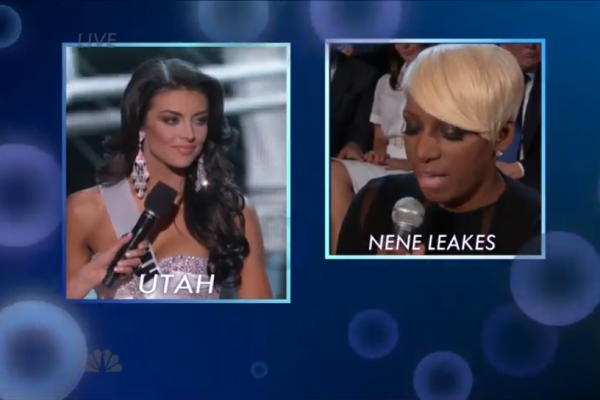The Internet is abuzz with Miss Utah. Marissa Powell was asked at Sunday night’s Miss USA Pageant:
“A recent report shows that in 40 percent of American families with children, women are the primary earners, yet they continue to earn less than men. What does that say about society?”
Powell responded: “I think we can relate this back to education, and how we are continuing to try to strive … to … figure out how to create jobs right now. That is the biggest problem right now. I think, especially the men are … um … seen as the leaders of this, and so we need to see how to … create education better. So that we can solve this problem. Thank you.”
Her answer was painfully incoherent, and as you can tell in the video, the poor girl knew it. There’s a bit of irony in the question that has been missed. Maybe we should be asking, “What does it say about our society that we still have these kinds of beauty pageants?”
These young women are paraded around a stage like sacrificial lambs. We admire their beauty, almost to the extent of objectifying them. But beauty is not the reason we watch. There are beautiful women on television all the time. We watch because we love to see someone fail.
The reason Powell has become a "scandal" in the United States is that her failure gives us a reason to feel superior. People.com says Powell, “botches her answer on Miss USA.” The Huffington Post states that she “fumbled” her question. USweekly.com declares that while Powell didn’t win Miss USA, she “definitely won the flub of the night!” Comments on the YouTube video pile on the negative judgment:
“I’d never want to date something as dumb as that, no matter what it looks like.”
“I tell ya the truth, miss Utah along with all those people sitting in there cheering are dumb. Our dogs prove daily that they are smarter than the human race.”
And:
“Why didn’t she just answer the question? She tried to tie her ‘answer’ to jobs and the economy. WHY? She should just keep it simple.”
Timothy Burke of Deadspin sums up how many felt during Powell’s answer, quoting Billy Madison:
What you've just said is one of the most insanely idiotic things I have ever heard. At no point in your rambling, incoherent response were you even close to anything that could be considered a rational thought. Everyone in this room is now dumber for having listened to it. I award you no points, and may God have mercy on your soul.
In what sense is Powell a scandal? In his book Compassion or Apocalypse?, James Warren reminds us that we misunderstand scandals if we think of them primarily as events that shock our moral sensibilities. Rather, scandals are events that have “both attracted and repelled [us] at the same time.”
For example, those who are scandalized by Powell are repelled by her “insanely idiotic” answer, and yet they are also attracted to her. She is, after all, a model of beauty in our culture. We are attracted to her because we know that very few people ever make it on a national beauty pageant. She is superior in beauty — a quality that we both admire and envy. We want to be beautiful like her, but there are too many obstacles in our way, so we envy her. The only way we can feel superior to her is if she fails, and then we can unite mimetically with others in a shared sense of superiority.
Feeling a sense of superiority over and against another is, of course, a sign of our own weakness. We need someone to fail to know that we are successful. We need someone to be bad to know that we are good. We need someone to make an “insanely idiotic” statement to know that we are smart.
So, what does it say about our society that we still have these beauty pageants? It means that we are addicted to scandals. We are addicted to gaining a sense of superiority by watching our cultural models fail.
What’s the solution? Warren claims that instead of a mimetic response of feeling superior against another, “we can have a mimetic response of compassion” toward all people. Instead of piling on the criticism when people make a mistake, how about we give them a second chance?
Fortunately, not everyone in the media is piling on the shame. The Today Show did give Powell a second chance. See how she responded:
Adam Ericksen blogs at the Raven Foundation, where he uses mimetic theory to provide social commentary on religion, politics, and pop culture. Follow Adam on Twitter @adamericksen.
Got something to say about what you're reading? We value your feedback!
